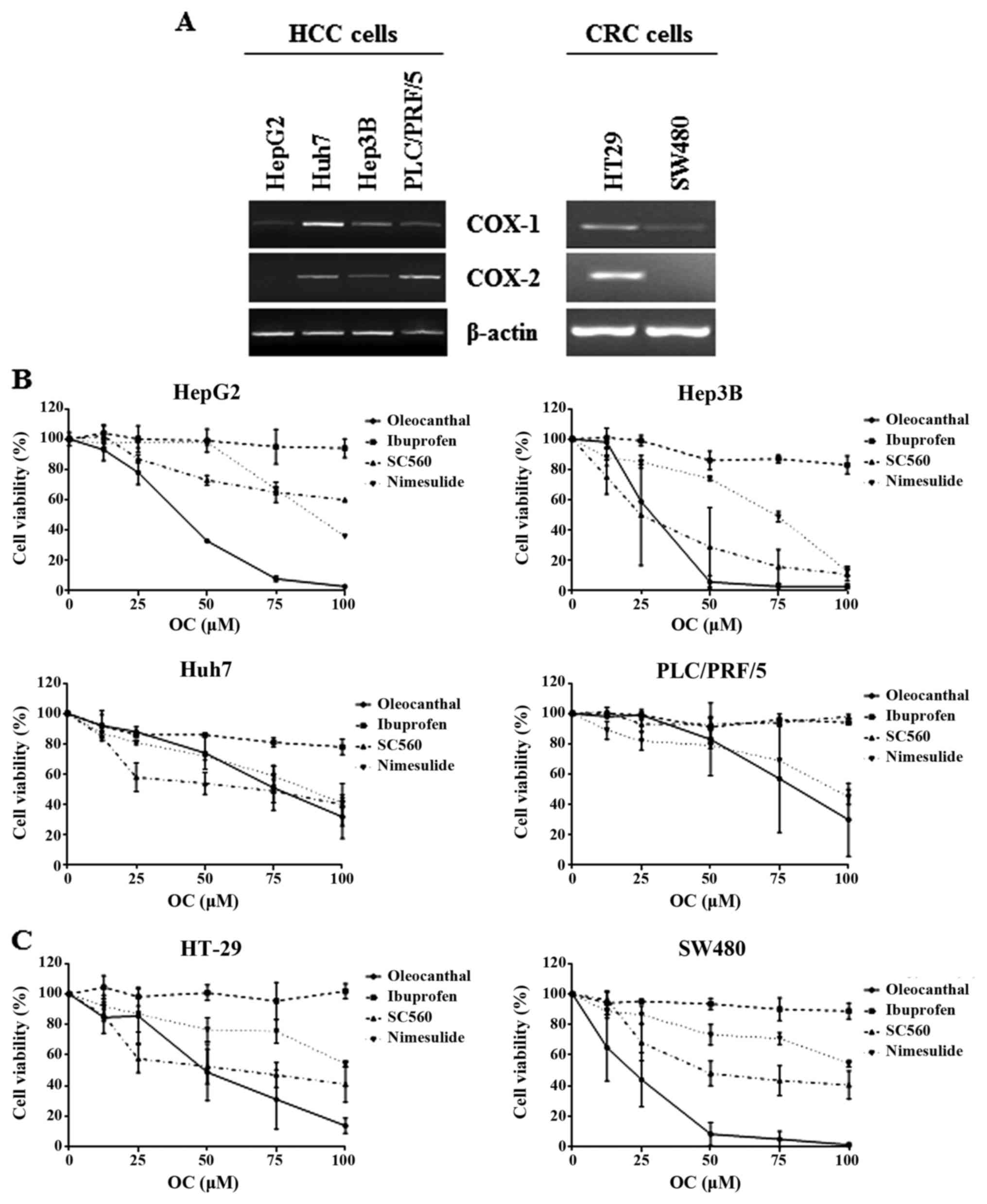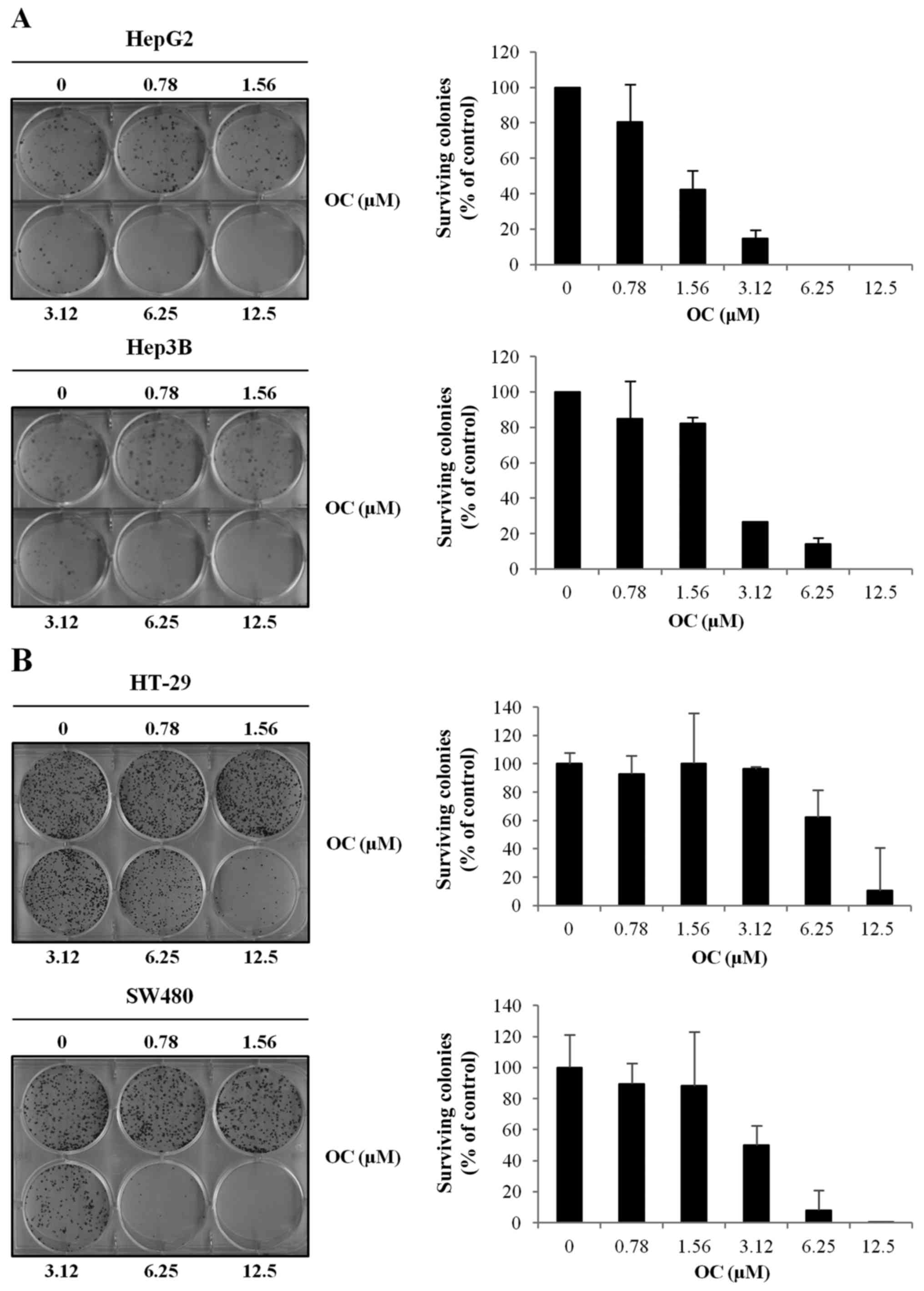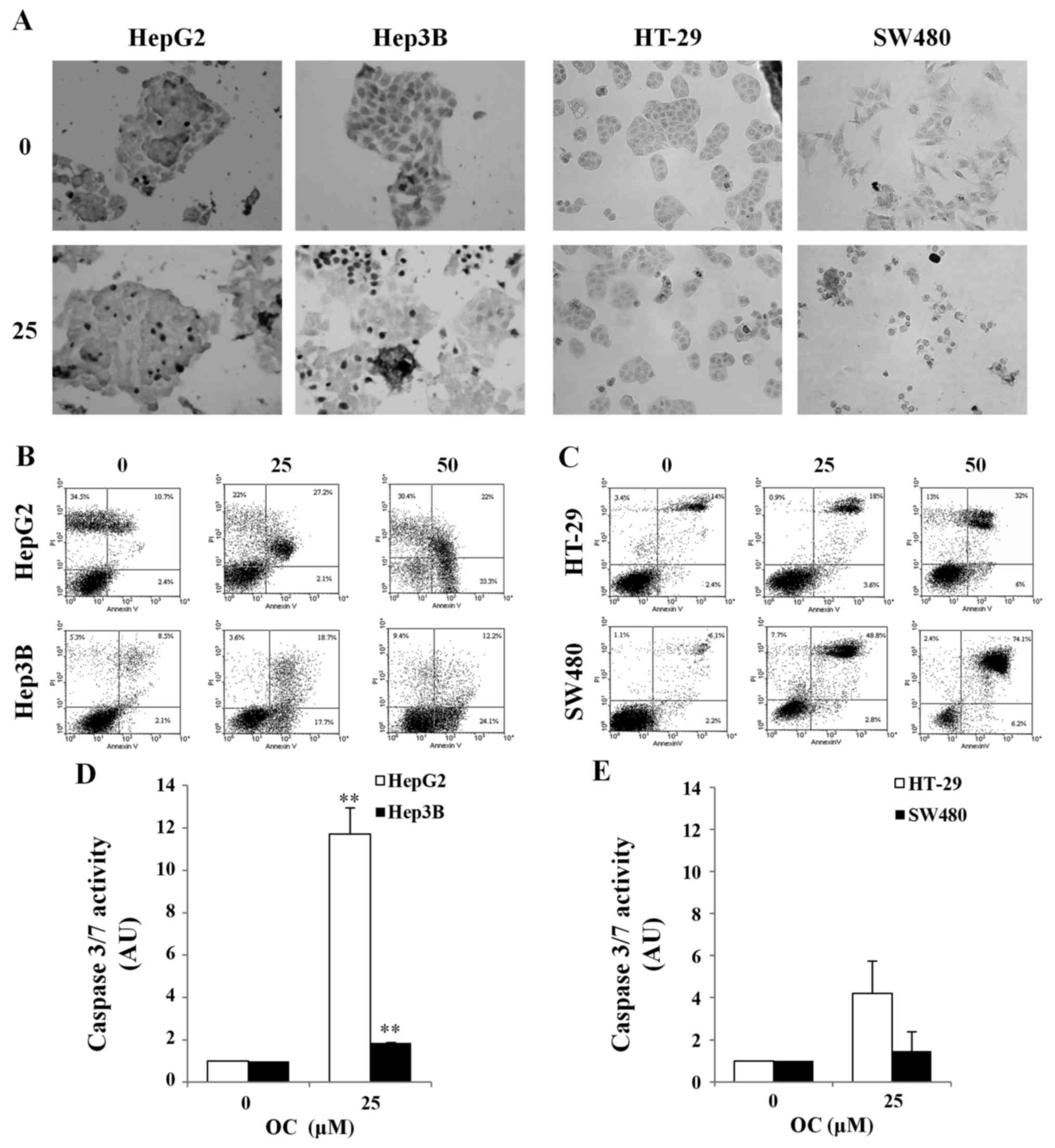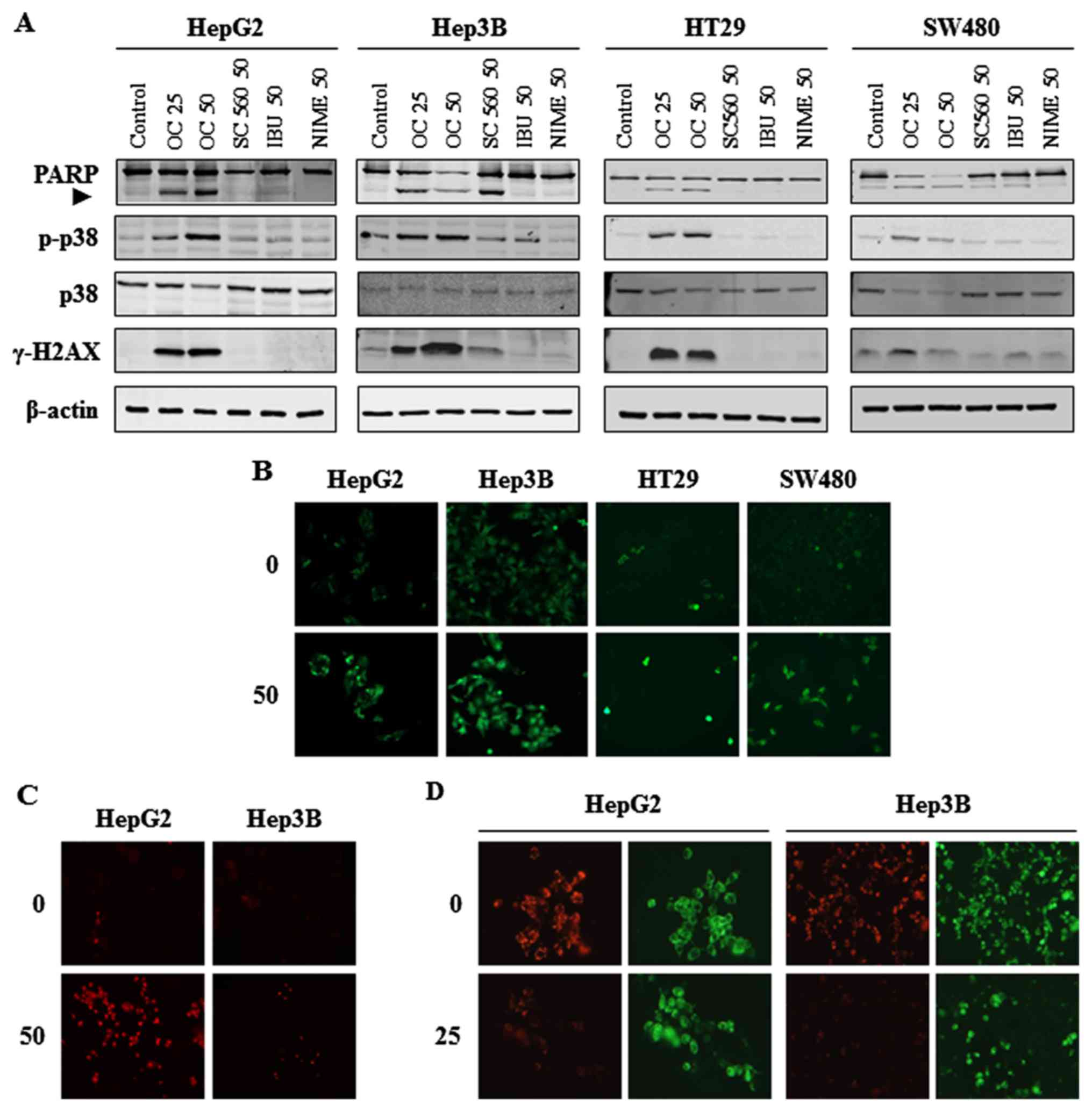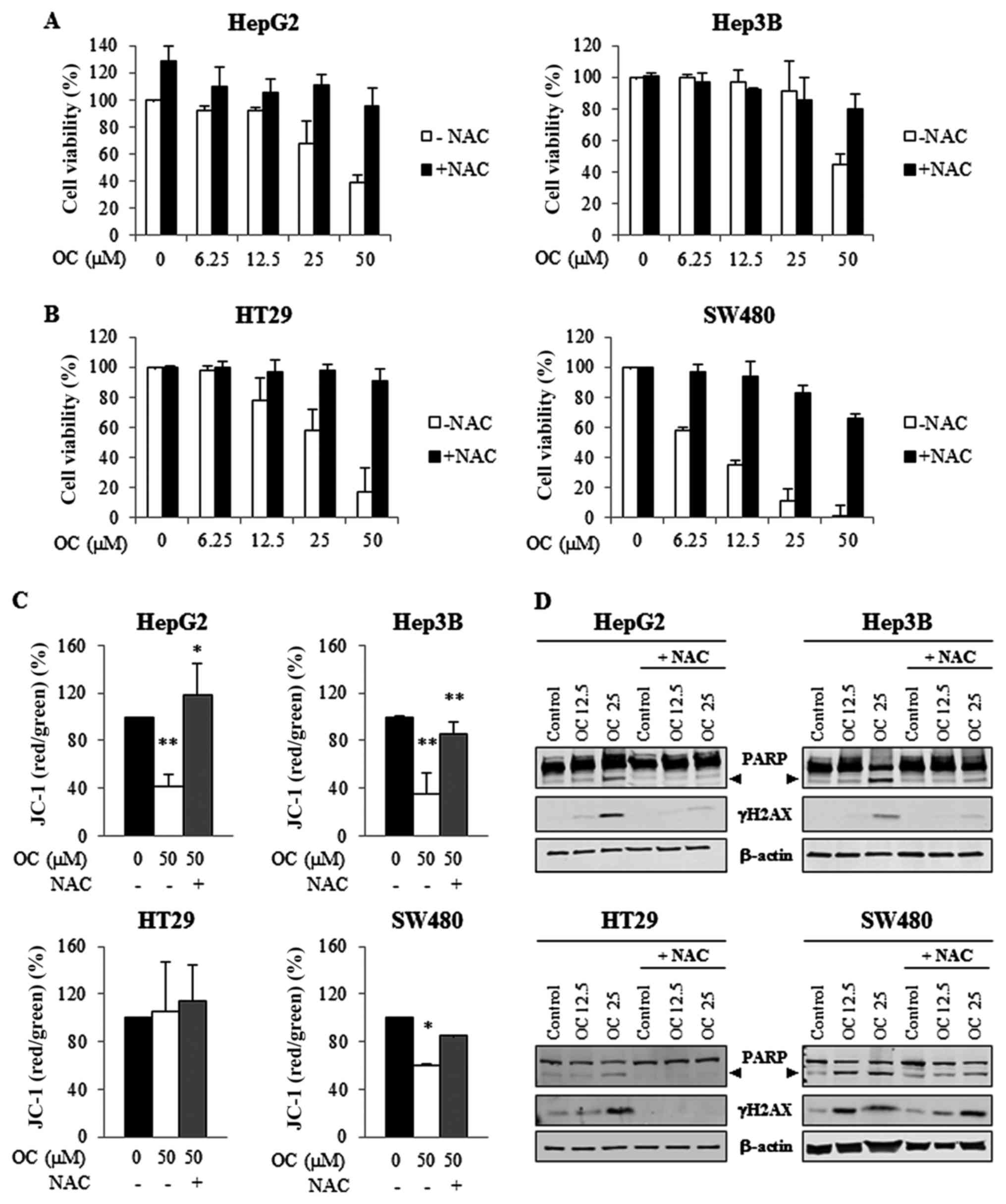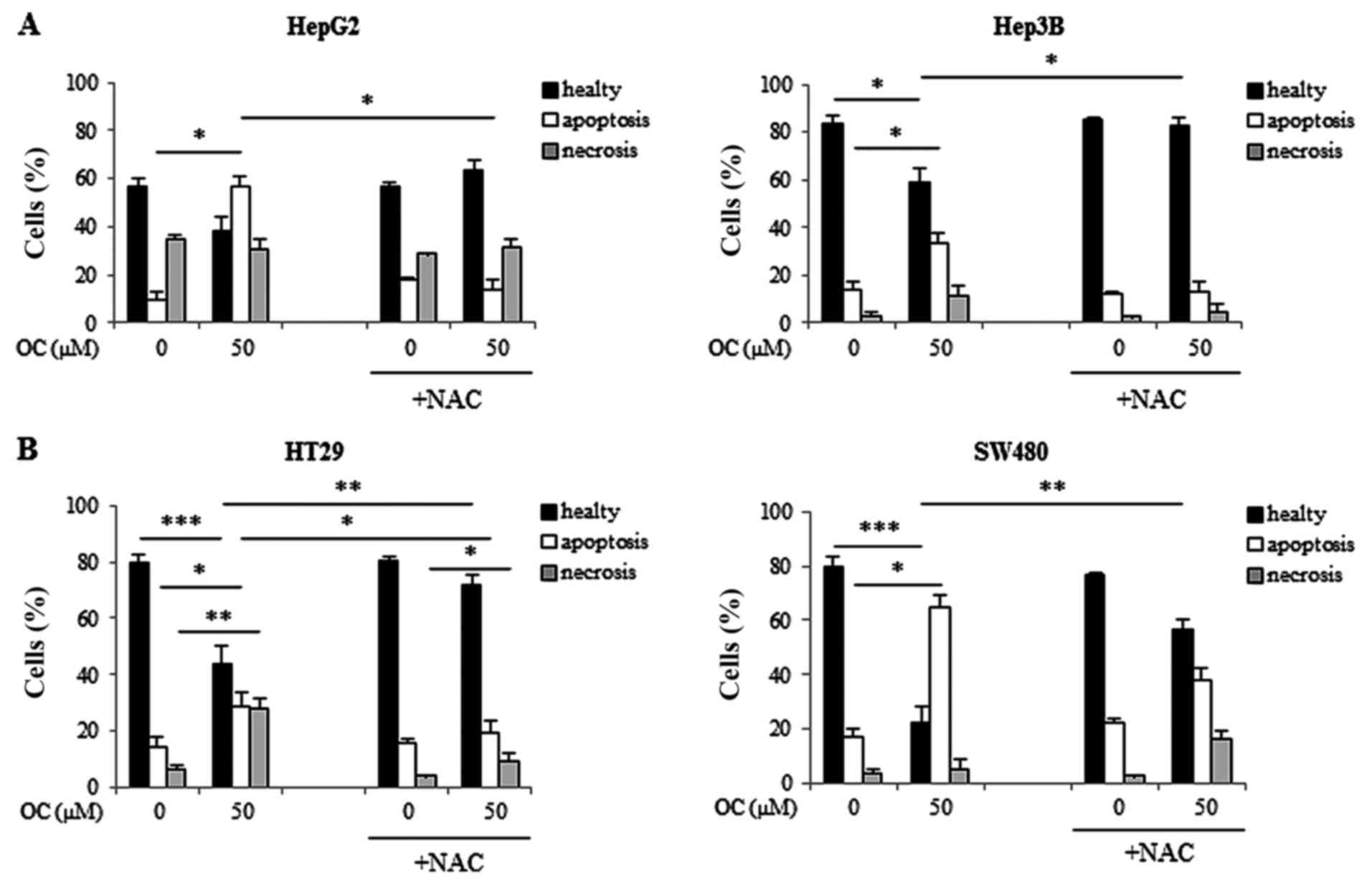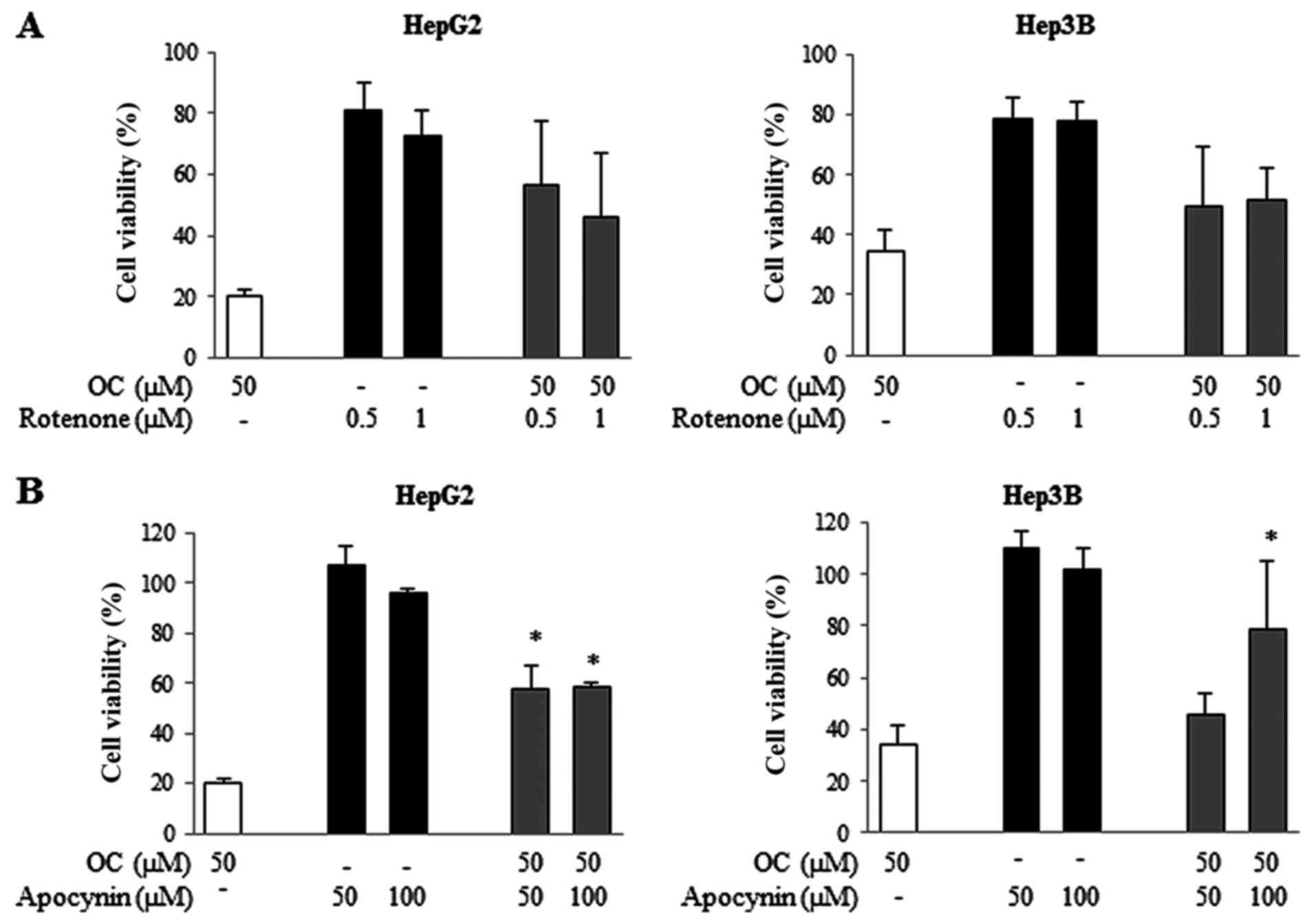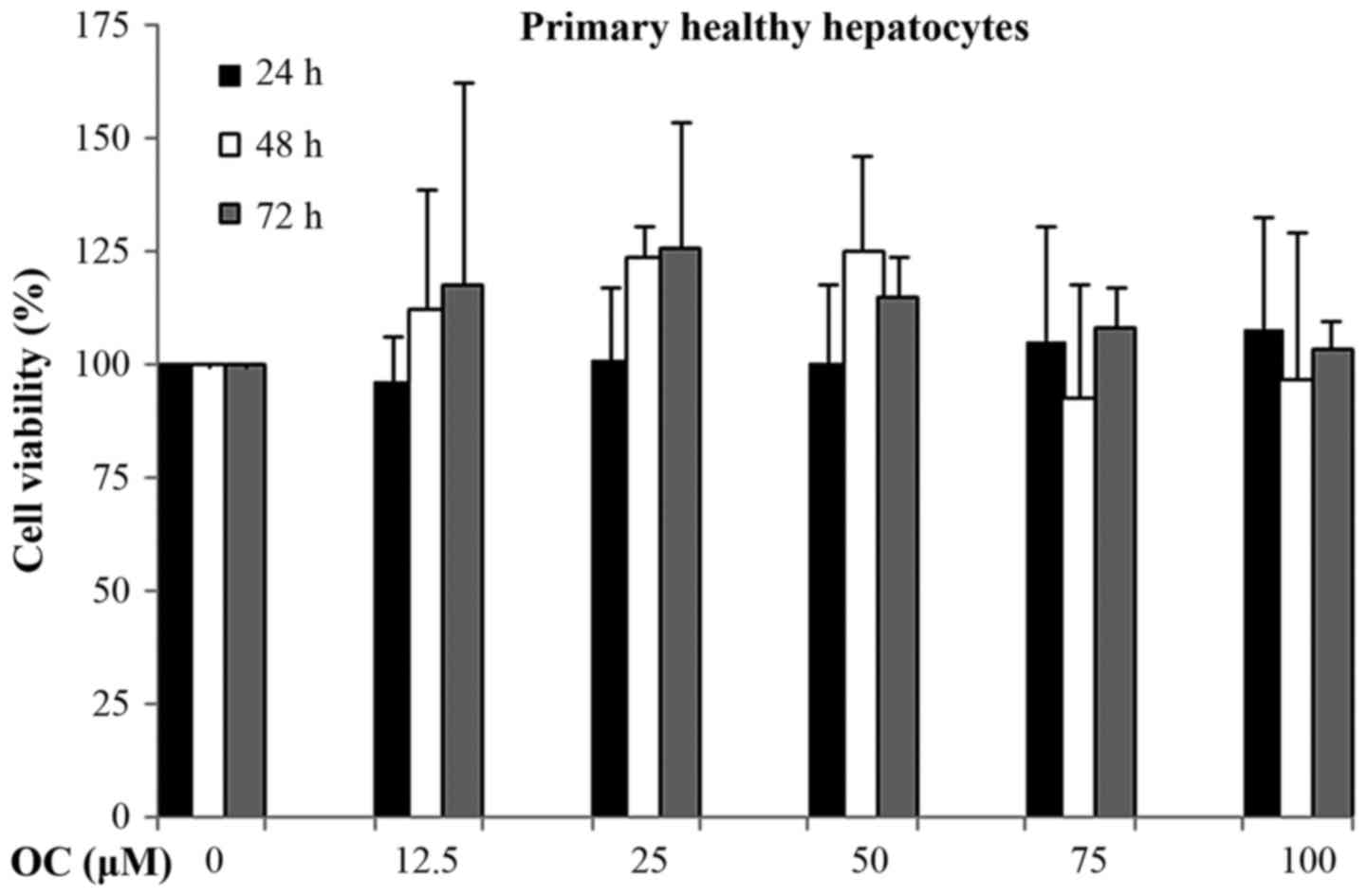|
1
|
Colomer R and Menéndez JA: Mediterranean
diet, olive oil and cancer. Clin Transl Oncol. 8:15–21. 2006.
View Article : Google Scholar : PubMed/NCBI
|
|
2
|
Tripoli E, Giammanco M, Tabacchi G, Di
Majo D, Giammanco S and La Guardia M: The phenolic compounds of
olive oil: Structure, biological activity and beneficial effects on
human health. Nutr Res Rev. 18:98–112. 2005. View Article : Google Scholar : PubMed/NCBI
|
|
3
|
Cicerale S, Lucas LJ and Keast RS:
Antimicrobial, antioxidant and anti-inflammatory phenolic
activities in extra virgin olive oil. Curr Opin Biotechnol.
23:129–135. 2012. View Article : Google Scholar
|
|
4
|
Cicerale S, Conlan XA, Sinclair AJ and
Keast RS: Chemistry and health of olive oil phenolics. Crit Rev
Food Sci Nutr. 49:218–236. 2009. View Article : Google Scholar
|
|
5
|
Cicerale S, Lucas L and Keast R:
Biological activities of phenolic compounds present in virgin olive
oil. Int J Mol Sci. 11:458–479. 2010. View Article : Google Scholar : PubMed/NCBI
|
|
6
|
Caramia G, Gori A, Valli E and Cerretani
L: Virgin olive oil in preventive medicine: From legend to
epigenetics. Eur J Lipid Sci Technol. 114:375–388. 2012. View Article : Google Scholar
|
|
7
|
Rafehi H, Ververis K and Karagiannis TC:
Mechanisms of action of phenolic compounds in olive. J Diet
(Suppl). 9:96–109. 2012. View Article : Google Scholar
|
|
8
|
Visioli F and Bernardini E: Extra virgin
olive oil's polyphenols: Biological activities. Curr Pharm Des.
17:786–804. 2011. View Article : Google Scholar : PubMed/NCBI
|
|
9
|
Omar SH: Oleuropein in olive and its
pharmacological effects. Sci Pharm. 78:133–154. 2010. View Article : Google Scholar : PubMed/NCBI
|
|
10
|
Beauchamp GK, Keast RSJ, Morel D, Lin J,
Pika J, Han Q, Lee C-H, Smith AB and Breslin PAS: Phytochemistry:
Ibuprofen-like activity in extra-virgin olive oil. Nature.
437:45–46. 2005. View
Article : Google Scholar : PubMed/NCBI
|
|
11
|
Akl MR, Ayoub NM, Mohyeldin MM, Busnena
BA, Foudah AI, Liu Y-Y and Sayed KA: Olive phenolics as c-Met
inhibitors: (−)-Oleocanthal attenuates cell proliferation,
invasiveness, and tumor growth in breast cancer models. PLoS One.
9:e976222014. View Article : Google Scholar
|
|
12
|
Elnagar AY, Sylvester PW and El Sayed KA:
(−)-Oleocanthal as a c-Met inhibitor for the control of metastatic
breast and prostate cancers. Planta Med. 77:1013–1019. 2011.
View Article : Google Scholar : PubMed/NCBI
|
|
13
|
Scotece M, Gómez R, Conde J, Lopez V,
Gómez-Reino JJ, Lago F, Smith AB III and Gualillo O: Oleocanthal
inhibits proliferation and MIP-1α expression in human multiple
myeloma cells. Curr Med Chem. 20:2467–2475. 2013. View Article : Google Scholar
|
|
14
|
Fogli S, Arena C, Carpi S, Polini B,
Bertini S, Digiacomo M, Gado F, Saba A, Saccomanni G, Breschi MC,
et al: Cytotoxic activity of oleocanthal isolated from virgin olive
oil on human melanoma cells. Nutr Cancer. 68:873–877. 2016.
View Article : Google Scholar : PubMed/NCBI
|
|
15
|
Pei T, Meng Q, Han J, Sun H, Li L, Song R,
Sun B, Pan S, Liang D and Liu L: (−)-Oleocanthal inhibits growth
and metastasis by blocking activation of STAT3 in human
hepatocellular carcinoma. Oncotarget. 7:43475–43491.
2016.PubMed/NCBI
|
|
16
|
Khanal P, Oh W-K, Yun HJ, Namgoong GM, Ahn
S-G, Kwon S-M, Choi H-K and Choi HS: p-HPEA-EDA, a phenolic
compound of virgin olive oil, activates AMP-activated protein
kinase to inhibit carcinogenesis. Carcinogenesis. 32:545–553. 2011.
View Article : Google Scholar : PubMed/NCBI
|
|
17
|
Khanfar MA, Bardaweel SK, Akl MR and El
Sayed KA: Olive oil-derived oleocanthal as potent inhibitor of
mammalian target of rapamycin: Biological evaluation and molecular
modeling studies. Phytother Res. 29:1776–1782. 2015. View Article : Google Scholar : PubMed/NCBI
|
|
18
|
Dhanasekaran R, Limaye A and Cabrera R:
Hepatocellular carcinoma: Current trends in worldwide epidemiology,
risk factors, diagnosis, and therapeutics. Hepat Med. 4:19–37.
2012.PubMed/NCBI
|
|
19
|
El-Serag HB: Epidemiology of viral
hepatitis and hepatocellular carcinoma. Gastroenterology.
142:1264–1273.e1. 2012. View Article : Google Scholar : PubMed/NCBI
|
|
20
|
Ferlay J, Shin H-R, Bray F, Forman D,
Mathers C and Parkin DM: Estimates of worldwide burden of cancer in
2008: GLOBOCAN 2008. Int J Cancer. 127:2893–2917. 2010. View Article : Google Scholar
|
|
21
|
Schütte K, Bornschein J and Malfertheiner
P: Hepatocellular carcinoma - epidemiological trends and risk
factors. Dig Dis. 27:80–92. 2009. View Article : Google Scholar
|
|
22
|
Thomas MB and Zhu AX: Hepatocellular
carcinoma: The need for progress. J Clin Oncol. 23:2892–2899. 2005.
View Article : Google Scholar : PubMed/NCBI
|
|
23
|
Llovet JM, Ricci S, Mazzaferro V, Hilgard
P, Gane E, Blanc J-F, de Oliveira AC, Santoro A, Raoul J-L, Forner
A, et al SHARP Investigators Study Group: Sorafenib in advanced
hepatocellular carcinoma. N Engl J Med. 359:378–390. 2008.
View Article : Google Scholar : PubMed/NCBI
|
|
24
|
Cervello M and Montalto G: Cyclooxygenases
in hepatocellular carcinoma. World J Gastroenterol. 12:5113–5121.
2006.PubMed/NCBI
|
|
25
|
Koga H, Sakisaka S, Ohishi M, Kawaguchi T,
Taniguchi E, Sasatomi K, Harada M, Kusaba T, Tanaka M, Kimura R, et
al: Expression of cyclooxygenase-2 in human hepatocellular
carcinoma: Relevance to tumor dedifferentiation. Hepatology.
29:688–696. 1999. View Article : Google Scholar : PubMed/NCBI
|
|
26
|
Leng J, Han C, Demetris AJ, Michalopoulos
GK and Wu T: Cyclooxygenase-2 promotes hepatocellular carcinoma
cell growth through Akt activation: Evidence for Akt inhibition in
celecoxib-induced apoptosis. Hepatology. 38:756–768. 2003.
View Article : Google Scholar : PubMed/NCBI
|
|
27
|
Foderà D, D'Alessandro N, Cusimano A, Poma
P, Notarbartolo M, Lampiasi N, Montalto G and Cervello M: Induction
of apoptosis and inhibition of cell growth in human hepatocellular
carcinoma cells by COX-2 inhibitors. Ann NY Acad Sci. 1028:440–449.
2004. View Article : Google Scholar
|
|
28
|
Lampiasi N, Foderà D, D'Alessandro N,
Cusimano A, Azzolina A, Tripodo C, Florena AM, Minervini MI,
Notarbartolo M, Montalto G, et al: The selective cyclooxygenase-1
inhibitor SC-560 suppresses cell proliferation and induces
apoptosis in human hepatocellular carcinoma cells. Int J Mol Med.
17:245–252. 2006.PubMed/NCBI
|
|
29
|
Cusimano A, Foderà D, D'Alessandro N,
Lampiasi N, Azzolina A, Montalto G and Cervello M: Potentiation of
the antitumor effects of both selective cyclooxygenase-1 and
cyclooxygenase-2 inhibitors in human hepatic cancer cells by
inhibition of the MEK/ERK pathway. Cancer Biol Ther. 6:1461–1468.
2007. View Article : Google Scholar
|
|
30
|
Cusimano A, Foderà D, Lampiasi N, Azzolina
A, Notarbartolo M, Giannitrapani L, D'Alessandro N, Montalto G and
Cervello M: Prostaglandin E2 receptors and COX enzymes in human
hepatocellular carcinoma: Role in the regulation of cell growth.
Ann NY Acad Sci. 1155:300–308. 2009. View Article : Google Scholar : PubMed/NCBI
|
|
31
|
Cusimano A, Azzolina A, Iovanna JL,
Bachvarov D, McCubrey JA, D'Alessandro N, Montalto G and Cervello
M: Novel combination of celecoxib and proteasome inhibitor MG132
provides synergistic antiproliferative and proapoptotic effects in
human liver tumor cells. Cell Cycle. 9:1399–1410. 2010. View Article : Google Scholar : PubMed/NCBI
|
|
32
|
Cervello M, Bachvarov D, Cusimano A,
Sardina F, Azzolina A, Lampiasi N, Giannitrapani L, McCubrey JA and
Montalto G: COX-2-dependent and COX-2-independent mode of action of
celecoxib in human liver cancer cells. OMICS. 15:383–392. 2011.
View Article : Google Scholar : PubMed/NCBI
|
|
33
|
Terzić J, Grivennikov S, Karin E and Karin
M: Inflammation and colon cancer. Gastroenterology.
138:2101–2114.e5. 2010. View Article : Google Scholar
|
|
34
|
Eberhart CE, Coffey RJ, Radhika A,
Giardiello FM, Ferrenbach S and DuBois RN: Up-regulation of
cyclooxygenase 2 gene expression in human colorectal adenomas and
adenocarcinomas. Gastroenterology. 107:1183–1188. 1994. View Article : Google Scholar : PubMed/NCBI
|
|
35
|
Gupta RA and Dubois RN: Colorectal cancer
prevention and treatment by inhibition of cyclooxygenase-2. Nat Rev
Cancer. 1:11–21. 2001. View Article : Google Scholar
|
|
36
|
Marnett LJ and DuBois RN: COX-2: A target
for colon cancer prevention. Annu Rev Pharmacol Toxicol. 42:55–80.
2002. View Article : Google Scholar : PubMed/NCBI
|
|
37
|
Ogino S, Kirkner GJ, Nosho K, Irahara N,
Kure S, Shima K, Hazra A, Chan AT, Dehari R, Giovannucci EL, et al:
Cyclooxygenase-2 expression is an independent predictor of poor
prognosis in colon cancer. Clin Cancer Res. 14:8221–8227. 2008.
View Article : Google Scholar : PubMed/NCBI
|
|
38
|
Piazuelo E and Lanas A: NSAIDS and
gastrointestinal cancer. Prostaglandins Other Lipid Mediat.
120:91–96. 2015. View Article : Google Scholar : PubMed/NCBI
|
|
39
|
Ghanghas P, Jain S, Rana C and Sanyal SN:
Chemopreventive action of non-steroidal anti-inflammatory drugs on
the inflammatory pathways in colon cancer. Biomed Pharmacother.
78:239–247. 2016. View Article : Google Scholar : PubMed/NCBI
|
|
40
|
Wang D and DuBois RN: The role of COX-2 in
intestinal inflammation and colorectal cancer. Oncogene.
29:781–788. 2010. View Article : Google Scholar
|
|
41
|
Smith AB III, Han Q, Breslin PA and
Beauchamp GK: Synthesis and assignment of absolute configuration of
(−)-oleocanthal: A potent, naturally occurring non-steroidal
anti-inflammatory and anti-oxidant agent derived from extra virgin
olive oils. Org Lett. 7:5075–5078. 2005. View Article : Google Scholar : PubMed/NCBI
|
|
42
|
Cusimano A, Puleio R, D'Alessandro N,
Loria GR, McCubrey JA, Montalto G and Cervello M: Cytotoxic
activity of the novel small molecule AKT inhibitor SC66 in
hepatocellular carcinoma cells. Oncotarget. 6:1707–1722. 2015.
View Article : Google Scholar : PubMed/NCBI
|
|
43
|
Gramignoli R, Green ML, Tahan V, Dorko K,
Skvorak KJ, Marongiu F, Zao W, Venkataramanan R, Ellis ECS, Geller
D, et al: Development and application of purified tissue
dissociation enzyme mixtures for human hepatocyte isolation. Cell
Transplant. 21:1245–1260. 2012. View Article : Google Scholar
|
|
44
|
Gramignoli R, Tahan V, Dorko K,
Venkataramanan R, Fox IJ, Ellis ECS, Vosough M and Strom SC: Rapid
and sensitive assessment of human hepatocyte functions. Cell
Transplant. 23:1545–1556. 2014. View Article : Google Scholar : PubMed/NCBI
|
|
45
|
Smith ML, Hawcroft G and Hull MA: The
effect of non-steroidal anti-inflammatory drugs on human colorectal
cancer cells: Evidence of different mechanisms of action. Eur J
Cancer. 36:664–674. 2000. View Article : Google Scholar : PubMed/NCBI
|
|
46
|
Zhang Y-J, Bao Y-J, Dai Q, Yang W-Y, Cheng
P, Zhu L-M, Wang B-J and Jiang F-H: mTOR signaling is involved in
indo-methacin and nimesulide suppression of colorectal cancer cell
growth via a COX-2 independent pathway. Ann Surg Oncol. 18:580–588.
2011. View Article : Google Scholar
|
|
47
|
Janssen A, Maier TJ, Schiffmann S, Coste
O, Seegel M, Geisslinger G and Grösch S: Evidence of COX-2
independent induction of apoptosis and cell cycle block in human
colon carcinoma cells after S- or R-ibuprofen treatment. Eur J
Pharmacol. 540:24–33. 2006. View Article : Google Scholar : PubMed/NCBI
|
|
48
|
Khan HY, Zubair H, Ullah MF, Ahmad A and
Hadi SM: A prooxidant mechanism for the anticancer and
chemopreventive properties of plant polyphenols. Curr Drug Targets.
13:1738–1749. 2012. View Article : Google Scholar : PubMed/NCBI
|
|
49
|
Lecci RM, Logrieco A and Leone A:
Pro-oxidative action of polyphenols as action mechanism for their
pro-apoptotic activity. Anticancer Agents Med Chem. 14:1363–1375.
2014. View Article : Google Scholar : PubMed/NCBI
|
|
50
|
León-González AJ, Auger C and Schini-Kerth
VB: Pro-oxidant activity of polyphenols and its implication on
cancer chemoprevention and chemotherapy. Biochem Pharmacol.
98:371–380. 2015. View Article : Google Scholar : PubMed/NCBI
|
|
51
|
Richter C, Ghafourifar P, Schweizer M and
Laffranchi R: Nitric oxide and mitochondrial Ca2+.
Biochem Soc Trans. 25:914–918. 1997. View Article : Google Scholar : PubMed/NCBI
|
|
52
|
Trudel S, Pâquet MR and Grinstein S:
Mechanism of vanadate-induced activation of tyrosine
phosphorylation and of the respiratory burst in HL60 cells. Role of
reduced oxygen metabolites. Biochem J. 276:611–619. 1991.
View Article : Google Scholar : PubMed/NCBI
|
|
53
|
Bedard K and Krause K-H: The NOX family of
ROS-generating NADPH oxidases: Physiology and pathophysiology.
Physiol Rev. 87:245–313. 2007. View Article : Google Scholar : PubMed/NCBI
|
|
54
|
Scalbert A, Johnson IT and Saltmarsh M:
Polyphenols: antioxidants and beyond. Am J Clin Nutr. 81(Suppl):
215S–217S. 2005.PubMed/NCBI
|
|
55
|
Ferroni F, Maccaglia A, Pietraforte D,
Turco L and Minetti M: Phenolic antioxidants and the protection of
low density lipoprotein from peroxynitrite-mediated oxidations at
physiologic CO2. J Agric Food Chem. 52:2866–2874. 2004.
View Article : Google Scholar : PubMed/NCBI
|
|
56
|
Gorrini C, Harris IS and Mak TW:
Modulation of oxidative stress as an anticancer strategy. Nat Rev
Drug Discov. 12:931–947. 2013. View Article : Google Scholar : PubMed/NCBI
|
|
57
|
Trachootham D, Lu W, Ogasawara MA, Nilsa
RD and Huang P: Redox regulation of cell survival. Antioxid Redox
Signal. 10:1343–1374. 2008. View Article : Google Scholar : PubMed/NCBI
|
|
58
|
Ivanova D, Bakalova R, Lazarova D, Gadjeva
V and Zhelev Z: The impact of reactive oxygen species on anticancer
therapeutic strategies. Adv Clin Exp Med. 22:899–908. 2013.
|















